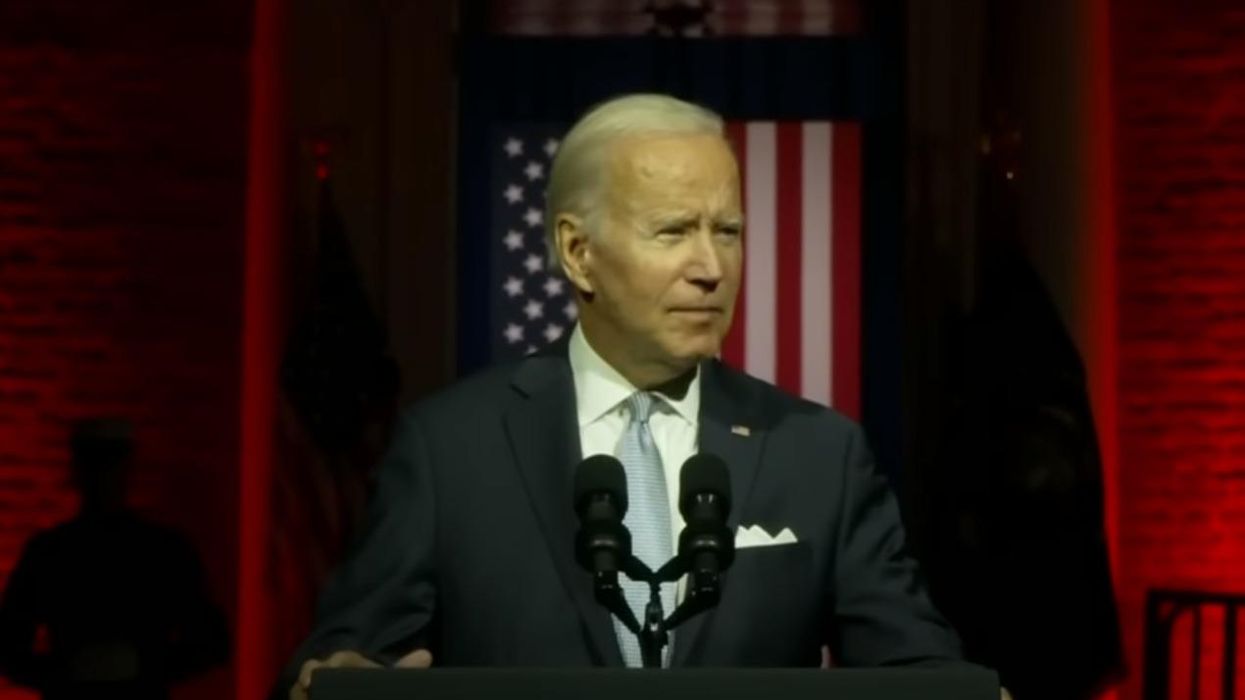How Biden's Massive Investment In America Became A Winning Democratic Issue
It hasn't even been two years since Joe Biden took the presidential oath at the Capitol, but his administration has quickly become one of the most consequential in generations, with transformational investments that will shape the next century of American enterprise.
The American Rescue Plan, the Bipartisan Infrastructure Law, the CHIPS Act, the Inflation Reduction Act — any one of these would be considered historic on their own merits. Together, they have formed a series of wins that is no less than astonishing for the first half of any president's first term.
Written off by many in the media, President Biden and Democrats in Congress deserve credit for doing in less than two years what former President Donald Trump couldn't do in four: put America first. And get through Infrastructure Week.
In fact, Democrats delivered an Infrastructure Decade. Through President Biden's Bipartisan Infrastructure Law, $1 trillion is now destined to level up America's infrastructure over the coming decade and beyond. It represents the most ambitious investment in America's infrastructure since President Eisenhower's national interstate highway system, which was built at a cost of slightly over $500 billion when adjusted for inflation.
And we are already seeing the effects of the Bipartisan Infrastructure Law in our communities. In the year since President Biden signed the legislation, nearly 7,000 projects across all 50 states, D.C., and Puerto Rico have been announced, and more are on the way. Nearly every week in our Beyond the Beltway newsletter, Invest in America compiles new stories from across the country about projects made possible by the Bipartisan Infrastructure Law, including plans for new and improved roads, bridges, ports, and airports; upgraded public transit and rail systems; lead pipes to be replaced to provide clean water; and affordable-high speed internet that will soon be accessible to every family in America. An interactive map on the GSA's website helps Americans visualize and explore the local impacts of this massive investment in our future.
Meanwhile, American companies are re-shoring jobs at a rate 150% higher than before the pandemic. The CHIPS Act has already led to significant investment in American manufacturing of semiconductors, with Intel announcing a new $20 billion plant in Ohio, creating good jobs right here in America. And when fully implemented, the Inflation Reduction Act, the largest investment in climate resilience ever enacted by Congress, will make America the global green energy leader.
The reforms and investments passed in these bills were bold — and broadly popular with the American people, in many cases across the political spectrum. The achievements arguably carried Democrats to the best first-term midterm performance for a party in power in 20 years, holding a fractious Republican Party to a slim majority.
They were so popular, in fact, that dozens of Republican lawmakers across the country, including some of the president's most virulent critics, touted projects and took credit for federal funding they voted against.
In Florida, Sen. Rick Scott, responsible for Republican Senate campaigns, celebrated $1 billion in federal funding for Everglades restoration they voted against in the infrastructure bill. Rep. Tom Emmer, responsible for Republican House campaigns, wrote to Secretary Pete Buttigieg to ask for infrastructure grants from the legislation. Even Sen. Ted Cruz (R-TX) took part, bragging about doing the "hard work" to secure what he called a "great bipartisan victory" for a highway project, despite also voting against the legislation.
On the Democratic side, candidates in tight races ran, and won, on President Biden's investments in America, delivering the first election since 1914 in which no incumbent senator was defeated.
For example, Nevada's Sen. Catherine Cortez-Masto regularly extolled the Bipartisan Infrastructure Law, which will fund the expansion of the Reno-Tahoe International Airport. The day after the Senate passed the infrastructure package, Sen. Mark Kelly (D-AZ) was in Tucson explaining how the bill could alleviate traffic by funding access roads on I-10. Sen. Maggie Hassan (D-NH) even highlighted the Bipartisan Infrastructure Law in her victory speech, stating the investment was "rebuilding our roads and our bridges, and bringing high-speed internet to communities all across New Hampshire."
Even candidates who never had the chance to vote for Biden's initiatives still campaigned on them. After a Pittsburgh bridge collapsed in January, now-Sen.-elect John Fetterman tweeted his praise for the Bipartisan Infrastructure Law, writing, "Pittsburgh is *the* city of bridges. Now more than ever, we need to get to work. We need to make use of the legislation President @JoeBiden ushered in, rebuild our roads + bridges, and fix our faulty infrastructure." Nine months later, President Biden visited the site where the bridge was being rebuilt on an accelerated timeline thanks to funding from the Bipartisan Infrastructure Law.
Halfway into his term, President Biden has already ensured his administration will leave a legacy of investment in our infrastructure, industry, and American workers on a scale unprecedented in modern times.
As the benefits of the Bipartisan Infrastructure Law, the CHIPS Act, the Inflation Reduction Act and the American Rescue Plan become more visible, Democrats must continue to run on their successful track record by reminding Americans who actually delivered on putting America first.
Zac Petkanas is a senior adviser to Invest In America, a campaign-style operation that influences the national debate in favor of robust public investment. Invest in America uses research, polling, expert validators, and targeted communications to reach and persuade elected officials and the American public.
Reprinted with permission from American Independent.

